Conservation Farmer of the Year
Conservation Farmer of the Year – 2018
Garrison Brothers Farm


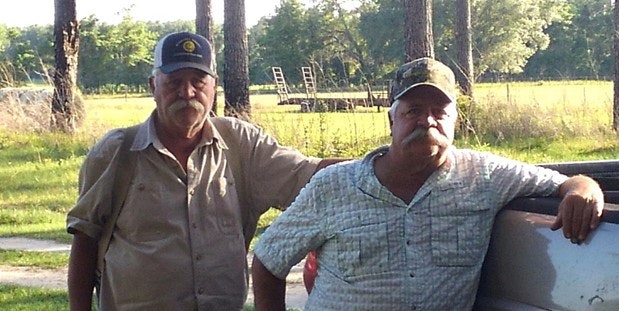



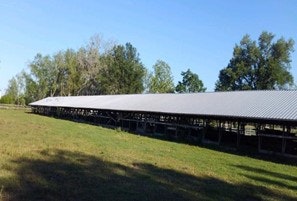









The Suwannee County Conservation District is pleased to recognize Don and Garry Garrison of Garrison Brothers Farm as their 2018 Conservation Farm Family of the Year. The Garrison family farm has been in operation for nearly seventy years at its current location just northwest of Live Oak, Florida. However, the Garrison family has been farming much longer than that. During the time of the Great Depression, the Garrison family moved from Georgia to Florida settling in the southern part of the state close to what we know today as Fish Eating Creek. Not long after that, the family relocated once again to the McAlpin area of Suwannee County, where part of the family still has the old home place. From there, members of the family began to spread to other areas of the county, and in the early 1950’s, Don and Garry’s dad started what is known today as Garrison Brothers Farm. Like many other farms in that era, things started small with a little bit of everything in the mix. The Garrisons farmed around 200 acres growing corn and tobacco, while also raising hogs and cattle. In the 1960’s they added chickens to their farming operation becoming one of the first farms in the county to build chicken houses and commercially raise poultry. The two poultry houses were built using lumber from trees harvested on the farm and were constructed from the ground up, including building the trusses on-site. These houses were some of the first ones built that were a clear span design without the support posts down the middle. The poultry houses were so well built that even though the Garrisons got out of the poultry business many years ago, one house is still located on the farm and has been utilized as both a hay barn and equipment shelter.
In the late 80’s, the Garrisons began to diversify their row crop farming operation by growing fresh produce. They grew tomatoes, squash, cucumbers, peppers and watermelons. This continued through the early 90’s. However, due to market fluctuations associated with the fresh produce market, they had to look for other opportunities. In the early 2000’s, they began growing peanuts and continued for several years until the market fell. Throughout all their years of row crop and fresh produce production, cattle were always a big part of the farming operation. As the row crops went away, their cow herd began to grow.
In their present-day operation, Don and Garry have transitioned from row crop to primarily a cow/calf operation. They are running around 800 head of cattle on nearly 800 acres in both Suwannee and Hamilton counties. These cattle include a small herd that fall into a specialized or niche market. In this herd, Don and Garry are utilizing an Akaushi bull, which is a Japanese breed, to produce calves that can be sold directly for the Kobe Beef market. Kobe beef is a high-end beef that is known for its high degree of marbling and is served mainly in upscale restaurants.
Everything done on the Garrison Brothers Farm today revolves around the cattle and making sure that their need for adequate forages and sustainable pastures are met, while also ensuring that the land that provides these things is taken care of. In order to meet these goals, the Garrisons enlisted the assistance from many of the agricultural related agencies such as the University of Florida IFAS, Florida Department of Agriculture, Natural Resources Conservation Service (NRCS) and the Suwannee County Conservation District (SCCD). In 2002, they began working with NRCS through the Environmental Quality Incentive Program (EQIP) to implement conservation practices like irrigation water management, nutrient management and pest management. In 2005 the Garrisons enrolled in the Conservation Stewardship Program with NRCS. This program took their conservation practices to the next level and incorporated rotational grazing, along with soil and energy management.
For their efforts in conservation and environmental stewardship, Don and Garry were also recognized in 2005 as a County Alliance for Responsible Environmental Stewardship (CARES) farm by the Suwannee River Partnership and Farm Bureau.
In 2006, with help from the SCCD and Florida Department of Agriculture, the Garrisons enrolled their farm in the statewide Best Management Practices (BMP) program. Through this program Don and Garry were able to implement practices to further protect their natural resources while maintaining adequate feed for the cattle. Some of the practices they implemented were no-till planting of their winter and summer grazing and utilizing multi-species blends that contain legumes such as Sun Hemp to help build the nitrogen in the soil and reduce the need for commercial fertilizer. Don and Garry were also able to utilize cost-share assistance through this program to purchase equipment needed to implement these practices.
The Garrison Brothers Farm has always had conservation and environmental stewardship as a priority in their operation. This is very evident based on the fact that they have farmed the same piece of land for almost seventy years. The only way this land can remain as sustainable as it has for that long is because of the Garrison’s stewardship efforts. By utilizing continually improving technologies and the latest BMP’s, the Garrisons will continue to improve the land and preserve the land for future generations. The Garrison Brothers now have the fifth generation of the family on the farm and hope to continue the operation well into the future.
Because of their excellence and dedication in practicing and applying exceptional environmental stewardship, the Suwannee County Conservation District is honored to present the 2018 Conservation Farm Family of the Year to Don and Garry Garrison of Garrison Brothers Farm.
Conservation Farmer of the Year – 2017
William Carte & Family – Stonewall Farm


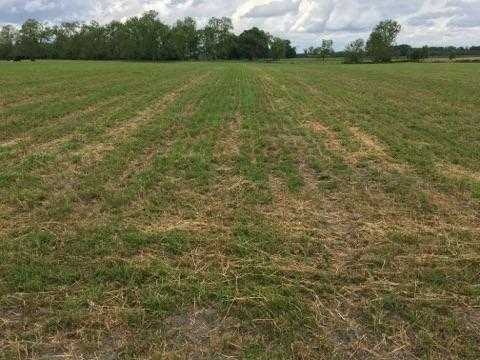





The Suwannee County Conservation District is honored to present the 2017 Conservation Farm Family of the Year to William and Sarah Carte of Stonewall Farm. Stonewall Farm has been operated in the central part of Suwannee County for over fifty years. It was originally started in 1965 by William’s parents, Tom and Shirley Carte, as a small cow/calf and row crop operation. Today, Stonewall Farm covers over 400 acres with cattle and row crop still at its core.
Stonewall Farm began small, as many family farms do, with only nine heifers and a small amount of row crop acreage. As time went by, the farm began to grow and diversify, and poultry was added to the operation in 1980. In the late 1990’s, the Cartes signed up on a voluntary basis to install a litter storage barn and implement a nutrient management plan for the use of the litter on their farm. With the help of the Suwannee County Conservation District (SCCD), the Suwannee River Partnership (SRP) and the Natural Resources Conservation Service (NRCS), the litter storage and composting facility was installed in 1997. The litter storage facility enabled the Cartes to compost birds that were lost during production rather than bury them. It also provided them with a means to store the litter from the poultry houses until it could be applied as fertilizer on crops and pasture during a time when the crops could best utilize the nutrients it contained. By implementing this practice, the Cartes were able to reduce the potential for nutrients to leach into the groundwater or run off into surface water.
William grew up working on the family farm and became a partner in the operation in 2000. It was then that the farm began to diversify and experience growth. In 2004, more land and peanuts were added to the crop rotation. In 2006, William and his wife Sarah assumed the leadership role for Stonewall Farm. For several years, William farmed the way it had been done forever-breaking and discing the land, planting into bare soil, fighting weeds and hoping for rain! In 2009, the poultry operation went away and cattle and peanuts became the primary source of income for the farm. With a greater level of importance focused on row crops, William knew there had to be a better and more efficient way to farm that would also take care of the land that he and his family were depending on to make a living. After doing much research and talking with many of the AG related agencies such as UF IFAS, Florida Department of Ag, and the Suwannee County Conservation District, William began working with the Natural Resources Conservation Service through their Environmental Quality Incentive Program (EQIP) to implement high residue strip-till planting.
In 2010, he began implementing this practice on the farm and according to William, “Strip-till farming is the best thing we have ever done.” Using strip-till planting with a high residue cover crop provides many benefits for the Cartes. With the majority of their acreage being dry land, the thick residue helps to maintain the moisture level of the soil which helps provide water to the plants in between rain events. The thick cover that protects and maintains the moisture level also suppresses the weed pressure. If the sunlight does not reach the ground, then the weed seeds that are present can’t germinate. The lack of weed pressure means that the plants have less competition for the available moisture and nutrients, resulting in healthier plants. It also means less money being spent on weed management. The utilization of cover crops also has another benefit for the farm.
As mentioned earlier, Stonewall Farm is also a cow/calf operation with over two hundred head of cattle. William is able to use much of his cover crops as winter grazing for their cattle. The cover crops are able to utilize any residual nutrients left behind by the previous crop and the cattle are able to recycle the nutrients available in the cover crop back to the soil, and it is then available to the next cash crop that is planted in the spring. The practice of utilizing cover crops and minimal tillage farming, combined with cattle in their framing rotation, is helping the Cartes improve the health of their soil, which in turn makes it more productive for many years to come.
In 2013, William took his conservation practices one step farther with the utilization of precision Ag. He began using grid soil sampling where soil samples are taken in a grid pattern over each field to determine the variability of the soil. Once this is done, maps are made showing this variability and are entered into a GPS system. The GPS system is then used along with a variable rate fertilizer spreader to apply fertilizer at different rates throughout each field on an as-needed basis. By implementing this practice, William is able to only apply fertilizer when and where it is needed, which reduces over fertilization and the potential for leaching into the groundwater.
Conservation and Environmental stewardship has been a priority for the Carte Family since the beginning. They understand the importance of caring for the land they farm and strive to be better stewards of the land. Their use of the latest technologies and Best Management Practices have enabled them to ensure that they leave the land better than they found it and preserve it for future generations. It is for these reasons the Suwannee County Conservation District is honored to recognize Stonewall Farm as our Conservation Farm Family of the Year.
Conservation Farmer of the Year – 2016
Jerry Goff – Goff Family Farm












The Suwannee County Conservation District is honored to present the 2016 Conservation Farm Family of the Year to Mr. Jerry Goff and Goff Family Farm. Goff Family Farm has been operated in the small community of McAlpin area for over 100 years. The Goff family was one of the original settlers and farms in the McAlpin area and is still going today. Presently Goff Family Farm is owned and operated by Jerry and his wife Montina. It is comprised of approximately five hundred acres used for crops such as corn, sorghum and peanuts along with a poultry operation that produces just short of a million birds per year.
The Goff Family Farm began as a tobacco, cattle, and row crop farm. From the very beginning conservation of the land has been their main focus. Jerry recalled that one of the most important lessons he learned from his dad at an early age was to “always leave a piece of land in better shape than it was when you got it”, and it did not matter whether it was owned or rented. This is the mindset that he still lives by to this day.
Jerry’s dad was a rather large tobacco farmer in the 1960s. He also grew corn and other crops along with running a good size herd of Hereford cattle. The Goff farm was like any other farm during this time, the primary labor force was comprised of mostly family. Jerry was the youngest of five children, four boys, and 1 girl. The children spent their summers working in tobacco and the fall emptying barns, fixing fences, and picking up pecans. It was during this time that Jerry began his training in stewardship and conservation of the land that they farmed. The lessons learned growing up as a farmer’s son would prove to be the basis for the way in which Goff Family Farm would operate from then on.
The untimely passing of Jerry’s father brought a lot of changes to the Goff Family Farm. Jerry took over the farm at the age of sixteen and by his early twenties had assumed sole responsibility for the farming operation including the mortgage. Tobacco was the mainstay of the farm for many years along with corn. However, corn fell by the wayside after a three-year drought in the late seventies. In the early eighties, Jerry began adding poultry houses to the operation, along with center pivot irrigation. Up until that point irrigation was expensive and fairly inefficient. With these additions to the operation, corn was put back into the crop rotation and the practice of conservation was even more important and started becoming more technical. The poultry litter proved to be an excellent fertilizer. Litter along with irrigation brought on some of the best corn yields the farm ever had.
These yields did not come without conservation challenges though. Along with most of the other poultry farms during this time, Jerry had nowhere to store the litter, so it either had to be spread throughout the year based on the grow-out schedule or stockpiled on the ground. Knowing there was a better way to utilize this material and to better protect the land and the water resource beneath it, Jerry enrolled in a program in the mid-nineties with the Natural Resources Conservation Service (NRCS) to voluntarily install storage facilities for the litter. By doing this, Jerry was able to apply the litter to his fields based on his soil test at a time when crops would be able to maximize nutrient uptake rather than possibly losing the nutrients to leaching. This practice not only helped protect the environment but also helped lower production costs and generate better yields. Another added benefit that was part of the litter storage facility was used for mortality management. Prior to this, all of the birds lost during production were buried on the farm. With the litter storage facility, the mortality is composted with the stored litter where it is later used to fertilize crops. By implementing this practice, Goff Family Farm earned recognition as a CARES farm in 2003. The County Alliance for Responsible Environmental Stewardship (CARES) program annually recognizes farms that have shown the initiative to implement Best Management Practices (BMPs) and conservation techniques that enable them to protect the land, surface water, groundwater and other important resource concerns such as soil and wildlife.
Farming is like most any other industry where things are always changing. Technology has become a huge player in the agriculture industry and is always evolving and improving the methods used to prepare, plant, grow and harvest crops. As Jerry said, “Profit margins are too small now days to farm in the dark. Whether you like it or not, change, record keeping and planning are vital to success in farming, which demands good conservation.” With this in mind, Jerry entered the world of precision farming. Precision farming is an advanced level BMP that takes a lot of up front capital to implement. Like any other form of technology, the newer it is, the more expensive it is. Jerry was able to utilize cost-share assistance from conservation agencies such as the SCCD and Florida Department of Agriculture (FDACS) to implement these practices. By utilizing the advancements in farming technologies such as GPS guidance, grid soil sampling and variable rate fertilizing, Jerry is able save time, seed, chemicals and fertilizer which in turn help the environment in a colossal way. For instance, now when fertilizer is applied to a crop, the application rate is varied based on the results of grid soil samples and crop tissue samples. The GPS guidance works off of the grid map and allows for the precise application of fertilizer when and where it is needed. Jerry stated “I would love to take my Daddy to the field with one of our GPS guided tractors. I would probably lose him when I turned loose of the steering wheel!”
The Goff Family Farm has been an excellent example of conservation and environmental stewardship for many years. Their love for the land and natural resources around them is evident any time you talk with Jerry about their operation. He is always searching for new and more efficient ways to ensure they leave the land better than it was when they got it. In his own words, “Conservation is not an option it is a necessity for our survival. Our occupation is solely dependent on what everyone else calls renewable resources which is what God has given us to be good stewards of. I think I speak for the majority of the farmers, that we do our best on conservation and animal welfare. In the past, we have made some mistakes, mostly through ignorance or a lack of funds but in the end, we always strive to do better.”
Conservation Farmer of the Year – 2015
Dr. Donald L. Burch & Family

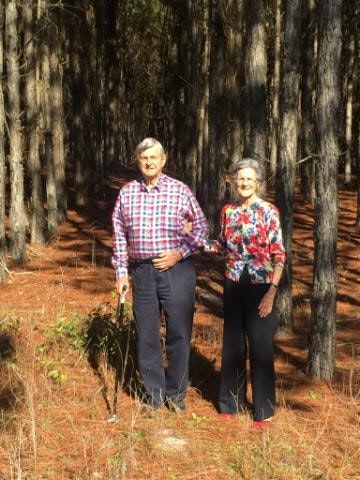

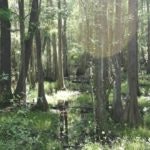






The Suwannee County Conservation District is honored to present the 2015 Conservation Farm Family of the Year to Dr. Donald L. Burch Sr. and Family. Over the last eighty years the Burch Family has farmed many areas of Suwannee County.
The inception of Burch Farms originated in 1937 with the 880-acre purchase of White Lake property by the father of Donald L. Burch, William Green Burch, Sr. A successful tobacco farmer of Roxboro, NC, the senior Burch arrived in Florida and South Georgia in the late 20’s to teach farmers the culture of growing tobacco as a replacement crop due to the disastrous decline of the cotton plantations. Having a keen eye for investments and soil suitable for tobacco farming, he began accumulating property over South Georgia, Hamilton, and Suwannee Counties.
His first practice engaging conservation began in 1937 with the planting of a soil builder, crotalaria, now a forbidden, prevalent weed known to be toxic to livestock upon consumption. At the time, the USDA inspector, Mr. O. B. Taylor, also identified a prolific crop of beggar lice as another soil builder and awarded Mr. Burch a small payment for growing these two insidious plants. How times have changed!
For the next 12 years, the Burch’s farm operation focused on growing the patriarch’s personal tobacco, teaching others the culture, and selling the ancillary products supporting the harvesting and processing of this valuable crop. Conservation practices of the day focused on the culture of soil builders and erosion prevention.
However, the untimely death of W. G. Burch, Sr. in 1949 brought a change in the agricultural pursuits of the family with the eldest son, W. G. (Bill) Burch, Jr. returning from the Navy and Donald a senior in high school. The farming focus was redirected to growing improved grasses for their cattle operation, upgrading the cattle herd, and growing other soil builders and forage food, as Hairy Indigo.
During the years that Donald was away at the University of Florida and Auburn School of Veterinary Medicine, the family rented the White Lake farm to families of the area to grow tobacco, corn, and cattle. At this time Donald, recognizing the beautiful virgin timber growing on the un-cleared portion of the property as one of their more valuable assets, became inspired to plant more pines.
In 1961 he and his wife, Betsy, returned to Suwannee County where they purchased an animal hospital to practice veterinary medicine with a dual focus on the care of large and small animals. During this time, he began planting improved slash pine seedlings at the farm upon the advice of Betsy’s father, P. C. Crapps, Jr., a fifth-generation timber man.
The 70’s and 80’s produced opportunities to purchase additional farms and to consolidate other family property into Burch Farms, Inc. The expansion of these land holdings and the increasing popularity of improved long leaf for the sandy soils of Suwannee County created a perfect scenario to expand the family’s timber operations. Participation in management practices, as soil and herbicide treatment programs, improved seedling choices, and fire prevention practices, increased as programs became available.
The family operation was recognized as a “Tree Farm” and ”Stewardship Forest” for its management practices in conservation, including water, timber, game, and recreation. Wildlife food plots provided food sources for game, as deer, turkeys, and quail. Duck boxes placed on cypress trees near ponds provided nesting habitats for ducks and other birds. In support of aquaculture programs, numerous ponds were stocked with fish, as bream, catfish, and bass. An interesting feature of one of the more visible ponds on County Road 136 West is an antique windmill, shipped from Kansas and reassembled and erected on site to supply water to the nearby fishpond.
Academic studies conducted by the University of Florida on one of the timber parcels have been completed to determine the volume of water filtration benefitting the slash and longleaf pine plantation. The results of these studies will benefit the population of our area as soil studies are released relative to water conservation, fertilization, and irrigation of similar soils.
Conservation and Best Management Practices of Silviculture inspired by the Suwannee County Conservation District, the Florida Forest Service, and NRCS/USDA have played an important role in the success of the Burch timber operations.
Some of the conservation practices Dr. Burch has implemented on the farm include Herbaceous Weed Control where the focus was on controlling Japanese Climbing Fern; Prescribed Burning; Implementing Special Management Zones; Timber Harvesting, Site Preparation and Planting; Fireline Construction; Upland Wildlife Habitat Improvement; and Wetland Wildlife Habitat Improvement. In appreciation, the family acknowledges the value of these support agencies and advocates their engagement with the farmers of our area.
Today’s family holdings represent a total of approximately 3,000 acres of improved long leaf and slash pine plantations. Managed by Dr. Burch over the years, the business has included timber and pine straw harvests, conservation practices, cattle operations, ecological studies, hunting, recreation, and camping.
The next generation of the Donald Burch family, Donald, Jr., Charlotte Burch Jones, and Anna Burch DeWitt, and their children, are perpetuating the legacy of soil conservation and managed forests by enjoying the beauty and benefits of Suwannee County investments initially made possible by their great-grandfather, W. G. Burch, Sr., and great-great grandfather, P. C. Crapps.
They are indeed realizing that with proper respect and care, “a thing of beauty is a joy forever.”
Conservation Farmer of the Year- 2014
Raymond L. Fletcher, Jr. & Family
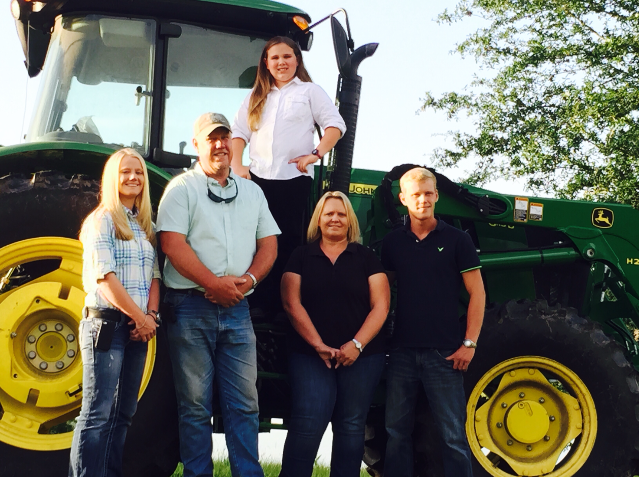
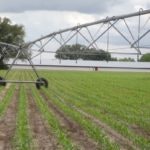




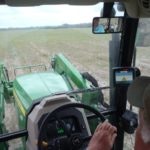







The Suwannee County Conservation District is honored to present the 2014 Conservation Farm Family of the year to Raymond L. Fletcher Jr. and Family. Over the last sixty years the Fletcher family has farmed in McAlpin, Florida. Their farm, located off of County Road 49, is approximately 700 acres. This area of Suwannee County has been home to the Fletcher family for over four generations. Throughout this time, the Fletcher family has been a leader in conservation farming. Each generation has farmed with the mindset of preserving the land for those that follow. Raymond, in his own words is “Just continuing on with what was started long before me”.
Over the years the Fletcher family farm has changed, as most farms do. In the early years tobacco was their main crop, along with cattle and other row crops. As time passed, areas of the farm were put into timber production, crop fields were converted to pasture for the cattle, and a few row crops were grown. In the late 1990’s poultry houses were added to the farming operation. Shortly after the poultry houses were built, Raymond signed up on a voluntary basis to install a litter storage barn. With the help of the Suwannee River Partnership (SRP), the Suwannee County Conservation District (SCCD) and the Natural Resources Conservation Service (NRCS), a litter storage and composting barn was installed. This barn enabled Raymond to compost birds lost during production, rather than bury them. It also provided him with a means to store the litter from the poultry houses until it could be applied as fertilizer on crops and pasture during a time of year when the crops could best utilize the nutrients. By being able to apply the litter when the plants could best utilize the nutrients it contains, Raymond was able to reduce the potential for the nutrients to leach into the ground water, or runoff to surface water. The litter storage barn provided a major environmental benefit for Raymond because unlike most farms in Suwannee County, the land that he farms has Little River running through it. According to Raymond, Little River is extremely important to him and his family. Over the years it has provided food for their family, a place for the family to swim and enjoy, and the opportunity to protect a very important natural resource by practicing good environmental stewardship. This is something that Raymond and his family are very proud to take part in. Things Raymond and his family have done over time to keep this beautiful body of water in its natural state is planting cypress trees to minimize erosion potential, fencing to exclude livestock, and maintaining a large conservation buffer between it and their farm fields. The Fletcher Family has long been recognized as exceptional stewards of their land. This effort of implementing voluntary conservation efforts has earned them recognition as a CARES Farm in 2001. The County Alliance for Responsible Environmental Stewardship or CARES program annually recognizes farms that have shown the initiative to implement Best Management Practices (BMPs) and conservation techniques that enable them to protect the land, surface water, ground water, and other important resource concerns such as soil and wildlife.
Over time and as the timber matured and was harvested, Raymond cleaned up and returned cut-over land back to farm land, as it was generations before. With more land in active tillage now than ever, good conservation is essential to Raymond’s farming operation and is part of his plan for sustaining his farming operation. By utilizing advancements in farming technologies such as precision farming with GPS, and the implementation of more advanced BMP’s on his farm, he is now able to conserve and protect his land better than ever. This has been a process and has taken time to accomplish. Raymond has relied upon technical and financial assistance from the SCCD, FDACS and NRCS to ensure that his transition back to a more tillage-based farm utilized the best conservation practices possible. Some of the conservation-based decisions Raymond has made for the farm include leaving approximately 150 acres in trees as wildlife habitat and stream protection; establishing a sod-based rotation to help improve soil health; and using no-till and conservation tillage practices when planting his crops. In 2013 Raymond voluntarily enrolled his land in the Florida Department of Agriculture’s (FDACS) BMP program. This program takes a whole farm approach to responsible environmental stewardship through the implementation of Best Management Practices. Many of the BMP’s outlined in this program were already being utilized by Raymond on his farm. However, Raymond saw this as an opportunity to implement additional conservation practices to help enhance his land. Practices such as intense rotational grazing and annual soil sampling to determine fertilizer needs were implemented. In 2014 with the assistance of BMP tools cost share administered by FDACS and the SCCD, Raymond was able to enhance his BMP’s one step farther with the purchase of GPS guidance and a nitrogen applicator. These tools have enabled him to apply his fertilizer in a more accurate and precise manor, reducing the risk of over-application. This offers both economic and environmental benefits.
Conservation and environmental stewardship has been at the core of the Fletcher Family Farm for over sixty years. To this day a sign baring the name of Raymond’s grandfather, who was honored for a similar award many years ago, hangs in their barn. A pecan tree that was planted from a seed generations ago still stands tall in the field south of Raymond’s home. The river that runs through the property is surrounded by lush grass, large oaks and cypress trees with cattle grazing in the background. Protecting and caring for his land through implementation of conservation and Best Management Practices has been both challenging and rewarding for Raymond. He looks forward to continuing his conservation efforts so that future generations of the Fletcher Family can farm just as he has done. It is his desire that his love of the land and his passion to make it better will be passed on, just as it was to him from his father and grandfather.
Conservation Farmer of the Year- 2013
A.W. Gaylard Family Farms
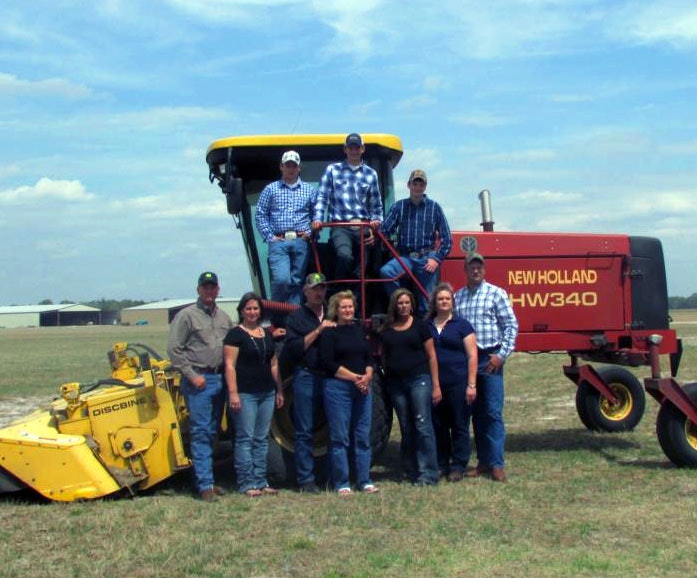
Conservation Farmer of the Year- 2012
Starling Farms

The Suwannee County Conservation District is proud to honor the Starling Family as the 2012 Conservation Farm Family of the Year. The Starlings (Claude and son Sammy) are leaders in conserving Natural Resources through their implementation of Best Management Practices, (BMPs) on their almost 400 acre farm. These practices are also used on another 700 acres of leased land yearly. Using field testing procedures and modern farming techniques, they have reduced their footprint on the environment, and are an excellent example of what stewardship means. Caring for the land is important now and for future generations. Using modern farming practices such as, BMPs, sod-based rotation, cover crops, etc, along with working with the local Conservation District and the Natural Resource Conservation Service (NRCS), they have lessened the impact on the Suwannee watershed. Protecting the land and the environment while still making a living farming, is important now, but even more important is to protect out Natural Resources for future generations.
Growing row crops such as corn, sweet potatoes, and peanuts keeps them busy year round. Working as a team, Claude and Sammy keep busy from morning until night during planting and harvesting seasons. Monitoring fertilizer and water usage from their 10 pivot irrigation systems helps keep our ground water and aquifer free from chemicals leaching through the soil. Keeping the Suwannee Valley water clean and chemical-free is helping all of Suwannee County. This is why their farm is a member of the County Alliance for Responsible Environmental Stewardship (CARES) program. The Starlings, along with environmental experts from SCCD and the Institute of Food and Agriculture Sciences (IFAS), conduct routine inspections to monitor and assure the proper use of fertilizer to help maintain soil and water quality. This allows for more efficient use of water, as well as fertilizer. This also protects the environment and helps keep costs down for a more profitable farming operation.
Along with their row crop farming operation, they have about 300 acres of grassland. They graze almost 200 cattle on these pastures, and this land is part of their sod-based rotation. Sod-based rotation allows more natural “soil-building” materials to be placed back in the land. Turning the topsoil over to allow the decaying plant material to increase the organic matter in the soil, can help reduce the need for extra fertilizer. This practice also allows for saving time and money by using less chemicals, and even save on fuel costs during this economic down turn. They also employ chicken litter as a source of Nitrogen and organic matter to enrich the soil. This is done as cover crops are planted, and the benefits are realized the next planting season.
Good land stewardship helps the farmer, the water quality, the soil, and ultimately all of Suwannee County and the whole Suwannee River Watershed. Claude and Sammy are certainly good stewards of the land. Their practices allow them to make a living farming, and still maintain and protect the natural resources now, and for future generations.
Conservation Farmer of the Year- 2011
Carter Farms



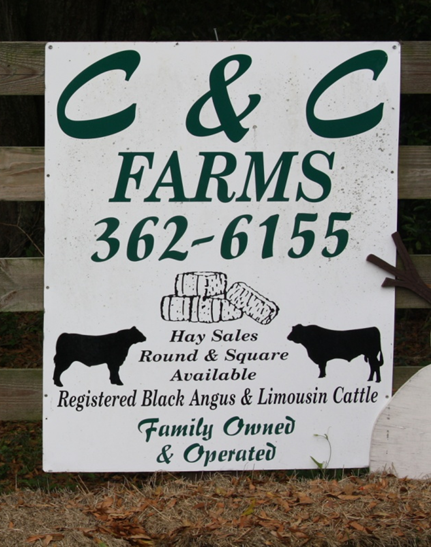






The Suwannee County Conservation District (SCCD) is proud to honor the Carter Family as the 2011 Conservation Farm Family of the Year. The Carter Farm is a leader in conservation of natural resources through Best Management Practices (BMPs), and is leading the way in poultry management and nutrient monitoring from their large poultry operation. Using computer monitoring and field testing procedures, they have reduced their footprint on the environment, and are an excellent example of what stewardship means and how important caring for the land has become. Protecting the land and the environment, while still making a living farming, is important now, but even more important is to protect and preserve our natural resources for future generations.
Carter Farms is proud to be a 3rd generation farming operation. John F. Carter and his wife Elinor began as dairy farmers after World War II. Beginning in the days when milk was bottled fresh on the farm, John and Elinor had a cash and carry dairy in Duval County. Their son John Douglas, born in 1946, grew up working the dairy and farming cropland. Douglas always knew he would follow in his father’s footsteps. He married Jacqueline Lee in 1969. They were married in their hometown of Baldwin, Florida. They have 3 grown children; Dana Tidwell (Dewayne), Donna Robinson (TY), and John Douglas II (Doug) (Deanne), and seven grandchildren; Carley, Cole, Matthew, Tyson, Gracie, Caige, and Trent.
The farm operation was moved to McAlpin, Florida in 1977. Actually, they began purchasing land in the area prior to moving to the small North Florida community. They now farm just over 400 acres. The dairy was sold in 1994, and now they manage a beef cattle herd of over 200 Angus and Limousin breeds, along with a large broiler operation.
About half of the land is used for pasture. The remaining land is divided between cropland and hay. Rye grass, millett, coastal, and bahia grass are harvested and bailed for winter feed. One pivot irrigation system is in place now that covers about 40 acres. Another pivot is in the works and should be up and running in the near future. They use BMPs to evaluate the soil to determine what nutrients are needed. Samples are sent to the Institute of Food and Agricultural Science (IFAS), a University of Florida testing facility. These results are used to help formulate the needed fertilizer requirements. This helps prevent the overuse of nutrients that would otherwise be wasted and possibly reach groundwater supplies. Saving money on commercial fertilizer and protecting the environment help keep the Carter Farm good stewards of the land.
The poultry operation has become a major part of the Carter Farm story. The poultry portion of the farm began in 1987 with the construction of 2 broiler houses. The houses hold between 24,000 and 25,000 birds. In 1989, two more houses were added, doubling the production capabilities. Four more houses were added in 2004, again doubling the production and these four are monitored by a computer. From the farm office, they can check temperature, water usage & consumption, feed usage & consumption, air pressure, fan operation and intervals, as well as electrical usage.
Because the poultry operation takes up so many man/woman hours, it has become more time consuming to manage properly. Everyone pitches in. The children and grandchildren help with the baby chicks, and also help with other farm chores. Grandpa John, Grandma Jackie and Douglas do all of the daily farm chores. Other family members provide extra help on weekends or during clean-out times between chicken flocks. The older grandchildren Carley, Cole, and Tyson help with setting up houses for new biddies. They are responsible for putting in feed pans and waterers. Even Caige, who is only 3, helps put down pans and loves hitching a ride on one of the many tractors on the farm.
Litter management and dead bird disposal is a priority for the poultry farmers in the Suwannee River Water Management District. Poultry farms like Carter Farms are making significant strides in the area of litter management in order to safeguard the environment. Working with the County Alliance for Responsible Environmental Stewardship (CARES), and implementing BMP’s, the Carter Farm has established and followed environmental management plans while maintaining a profitable agricultural business. By performing environmentally conscious actions of litter removal, dead bird and litter composting, litter storage, and litter application, they are contributing to sustaining a cleaner, safer, and healthier environment.
Monitoring litter removal during the winter/summer seasons allows for greater benefit to the farm throughout the year. Minimal amounts of litter are taken between flocks during the winter to ease storage issues. More is taken during the warmer months to be used during the growing season. The litter is spread on the grass fields in regulated amounts to allow the plant the most efficient use of needed nutrients with the least amount of waste. This cuts commercial fertilizer costs significantly. This is accomplished through testing by a conservation field technician from the SCCD. Litter and soil samples are sent for testing by IFAS. The testing measures levels of potassium, phosphorus, magnesium, and other nutrients within the soil. Regulating the amount of litter used and measuring the nutrient level in the litter, along with evaluating and determining the soil needs, makes the best use of the available nutrients in the litter.
A Comprehensive Nutrient Management Plan (CNMP) was developed for the Carter Farm by the USDA-Natural Resources Conservation Service(NRCS) in 2002. The CNMP addresses both Nitrogen and Phosphorus concerns for the farm. In developing the CNMP, it was determined by NRCS that Phosphorus was a lesser environmental concern than Nitrogen because the soils on the Carter farm have the ability to bind Phosphorus, thereby limiting its’ movement throughout the soil profile. Therefore, nutrient application can be based on Nitrogen requirements of the crops. This allows money savings on commercial fertilizer well as making the best use of the land.
Carter Farm cares about implementing the best management practices possible to provide environmentally friendly means of proper litter removal, storage, and application. By implementing a plan of action, the Carter family farm operation is a profitable business, and an environmental friendly steward of the available natural resources.
Conservation Farmer of the Year- 2010
Jack and Riley Putnal Farms
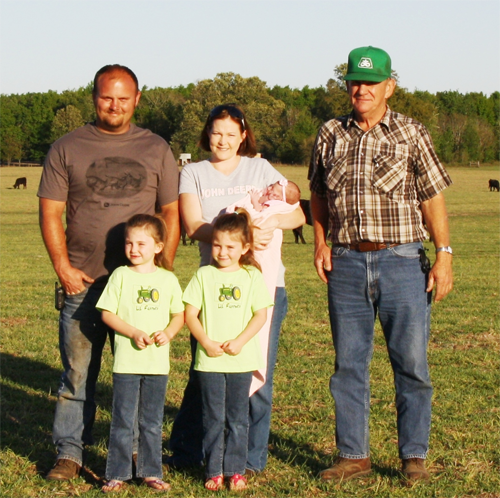
It is the Suwannee County Conservation Districts privilege to recognize this year’s Conservation farm family of the year as Putnal Farms. The Putnals are using cutting edge technologies in their day to day farming routine from using a TDR probe to check moisture in their watermelon crop to using GPS auto steer tractors applying fertilizers to peanut crops to avoid over application.
Jack and Riley Putnal, aka “ The Watermelon Men” have been working with several different agencies to help protect our environment; Suwannee County Conservation District, USDA – Natural Resources Conservation Service, and University of Florida Extension Service.
Jack began his farming career in the 60’s and continued to grow throughout the 70’s and decided to put down roots in 1979 by buying a feed mill off of Charles Spring Rd. and in the same year his partner; Riley, was born. From this point they have continually grown their operation but not without diligence and hard work. Hard work could be these guys middle name, and they can tell you that successful farming does not happen between 8 and 5.
Riley, through the past several years has taken their watermelon production to an all new level with the incorporation of the latest best management practice available. Naming just a few of the technologies would let you realize the level of technology that Riley and Jack have grasped and put to work for Putnal Farm. Naming just a few: Cardy plant sap meters to measure Nitrogen and Potassium in the field, TDR moisture probe to measure moisture in the plant bed to avoid over irrigation, auto switching irrigation valves, and GPS auto steer guidance systems for planting, fertilizer, and pesticide application. These sound impressive, but we haven’t even mentioned the traditional conservation techniques that they have incorporated on their farm like cover crops (really some of the best I’ve seen), strip till planting, and nutrient, pest, and irrigation management.
It gives me honor to be able to give an introduction for such a passionate family towards responsible agriculture.
Conservation Farmer of the Year- 2009
Ryan and Reed Moore Farm

By: Cliff Starling – Resource Consultant
WHERE’S THE BEEF?
Chances are that each of us is affected by Cattle Producers just about everyday of our lives. For example, each time you enjoy a juicy T-bone steak or hamburger, or put on your favorite leather boots, cattle production was involved. Even medicines that contain trypsin, which help promote healing for skin graft patients, are derived from bovine products. The fact is that cattle have a significant impact on our lives, especially in Suwannee County where they outnumber people.
The Suwannee County Conservation District (SCCD) is proud of our Farmers and Ranchers who voluntarily implement Best Management Practices (BMP). These producers use their valuable time to find new and effective ways to conserve the resources that our community relies on now and in the future. Environmental Conservation has become a way of life for these producers who implement BMPs in an effort to protect and conserve the precious resources critical to their livelihoods. So the next time you see one of these producers, thank him or her for protecting Suwannee County’s natural resources.
SCCD would like to honor the Ryan and Reed Moore Farm with the 2009 Conservation Farm of the Year Award for their use of BMPs. Moore Farm is a leader in Conservation Farming and Ranching. The Moores have seen first-hand the benefits that can come from implementing BMPs.
In the mid-1920s Mr. R.F. Moore purchased 40 acres north of the once booming phosphate mining town of Luraville. Through the Great Depression, Mr. Moore managed to maintain and grow his farm by producing tobacco, peanuts, corn, and raising cattle and hogs. Later, Mr. Moore’s sons were able to help out and Revis took control of family farm operations. Mr. Revis Moore, with the help of his wife Frances, tended the land for many years. Their two sons, Reed and Ryan, grew up working the farm too. Reed and Ryan Moore now manage the farm located on south State Road 51 just north of Luraville. Moore Farm is mainly comprised of an intensive beef cattle operation accompanied by grazing forages, hay, peanut, and timber production. Their operation incorporates the most cutting-edge conservation techniques available. When asked about the key to their success, Ryan and Reed answered simultaneously, “Taking care of the land and resources crucial to our living.” Land stewardship is a priority for the Moore brothers; a family philosophy passed down through the generations. The Moores realize the importance of sustainability and work to ensure that their soil and water resources remain healthy. They believe in whole-farm conservation, focusing on the big picture when it comes to stewardship.
In order to improve the natural resources on their land, the Moores have partnered with local community and government organizations, including the U.S. Department of Agriculture, Natural Resources Conservation Service, and the Suwannee County Conservation District. The Moores realized long ago that their farming activities affected the immediate area, as well as surrounding water-bodies and river systems, including the Suwannee River. To combat any potentially adverse effects, the Moore brothers implemented rotational crop planting sequences, nutrient, pest, irrigation management, and forage and soil sampling, all enhancing their grass and crop production. The core of their farm conservation is Nutrient Management. This conservation tool is important to every square inch of farmland. With the help of SCCD and Natural Resource Conservation Service (NRCS), the Moore brothers have designed a soil sampling program that allows micro-management of soil nutrients for optimal plant and animal health. Their irrigation management works jointly with their nutrient management program. The Moores have retrofitted their irrigation systems with updated pressure regulators, x-wob sprinklers, and drops to get the water application near the soil and in larger droplets. This strategy prevents water from being applied off target due to wind. The updates have made their existing irrigation pivots apply water more efficiently and uniformly to crops, saving both energy and water. In addition, Ryan and Reed irrigate their crops based on plant stage need, which prevents over-irrigation and washing nutrients past the plants’ root system.
The Moores’ beef cattle operation uses many techniques that are important to maintaining and improving their total environmental surroundings. One conservation tool they use is rotational grazing.
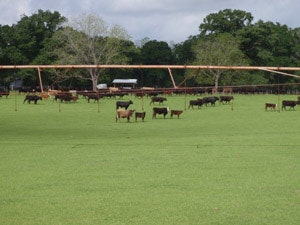
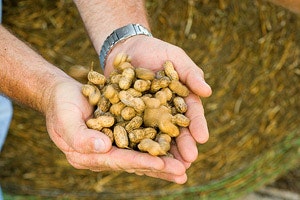




Rotational grazing allows the Moores to utilize the best quality grass and prevents over-grazing, which can lead to degradation of the grass crop. If the grass crop is over-grazed, then the plant’s ability to absorb and use nutrients from the soil profile is greatly reduced due to lack of transpiration, respiration, and photosynthesis. This may also result in soil destabilization, making it prone to wind and water erosion. Ryan and Reed use a minimum tillage program with winter and summer annual plantings. Minimum tillage is a practice that helps reduce wind erosion of the soil; high winds in springtime can cause soil to be blown and lost due to misplacement. The loss of topsoil means a loss of nutrients and water holding capacity.
The Moores use a 4-6 year rotation for their peanut production areas with Bahiagrass. After peanuts are harvested, they plant a fall cover crop to use any excess nutrients and to protect the soil from erosion. When the cover crop has run its course, Ryan and Reed plant Bahiagrass for grazing and seed production.
Along with production-based conservation, the brothers are avid hunters and outdoorsmen. They maintain a 15-acre natural preserve on their farm, adjacent to one of their slash pine fields. By planting tracts of pine for timber production, the Moores created valuable wildlife habitats. They even plant annual and perennial food plots for wildlife that frequent their farm.
BMP implementation on production areas has proven to be successful both environmentally and economically for Ryan and Reed Moore Farms. It is our honor to present them with the Suwannee County Conservation District 2009 Conservation Farm of the Year Award. Congratulations!